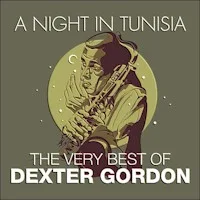Time: 58:48
Size: 134.6 MB
Styles: Bop, Saxophone jazz
Year: 1965/1987
Art: Front
[ 8:25] 1. Manha De Carnaval
[ 5:12] 2. Who Can I Turn To
[ 7:48] 3. Heartaches
[ 6:16] 4. Shiny Stockings
[ 6:43] 5. Everybody's Somebody's Fool
[ 6:58] 6. Le Coiffeur
[ 6:50] 7. Very Saxily Yours
[10:33] 8. Flick Of A Trick
Bass – Bob Cranshaw; Drums – Billy Higgins; Piano – Barry Harris; Tenor Saxophone – Dexter Gordon; Vibraphone [Vibes] – Bobby Hutcherson.
Dexter Gordon's mid-'60s period living in Europe also meant coming back to the U.S. for the occasional recording session. His teaming with Bobby Hutcherson was intriguing in that the vibraphonist was marking his territory as a maverick and challenging improviser. Here the two principals prove compatible in that they have a shared sense of how to create sheer beauty in a post-bop world. Add the brilliant Barry Harris to this mix, and that world is fortunate enough to hear these grand masters at their creative peak, stoked by equally extraordinary sidemen like bassist Bob Cranshaw and drummer Billy Higgins, all on loan from Lee Morgan's hitmaking combo. The subtle manner in which Gordon plays melodies or caresses the most recognizable standard has always superseded his ability to ramble through rough-and-tumble bebop. It's hard to resist how Gordon massages the light and sweet bossa nova "Manha de Carnaval" hand in hand with Hutcherson, the heartfelt way "Who Can I Turn To?" or "Everybody's Somebody's Fool" is turned into a personalized statement, or how the co-leaders take Frank Foster's Count Basie staple, "Shiny Stockings," beyond a classic and into immortal territory. Where Gordon and Hutcherson's true strength lies is in their ability to listen and balance their sound into a unified whole beyond any other tenor sax-vibraphone combination you might care to name, unless it's Hutch's partnership in the ensuing years with Harold Land. Picking up on a Sonny Rollins idea, "Heartaches" is a loping cowboy-type swinger with some lustrous comping from Hutcherson and Harris, while the light, cat-prancing "Le Coiffeur" is the highlight among highlights, a stealth calypso with Gordon's deftly rendered staccato notation. One has to listen closer to the pianist on this date, as he buoys the others without demanding equal space, but he is just as reverberant. While this is not Gordon's ultimate hard bop date, it is reflective of his cooling out in Europe, adopting a tonal emphasis more under the surface than in your face. It's not essential, but quite enjoyable, and does mark a turning point in his illustrious career. [The CD version contains two bonus tracks, including the Onzy Matthews composition "Very Saxily Yours" with a melody very similar to "Shiny Stockings," Hutcherson alone during a second chorus, and a classy quarter-to-eighth note solo by Gordon. Ben Tucker's "Flick of a Trick" is added on, an 11-minute groove blues that lets Harris cut loose, digging in after-hours style.] ~Michael G. Nastos
Dexter Gordon's mid-'60s period living in Europe also meant coming back to the U.S. for the occasional recording session. His teaming with Bobby Hutcherson was intriguing in that the vibraphonist was marking his territory as a maverick and challenging improviser. Here the two principals prove compatible in that they have a shared sense of how to create sheer beauty in a post-bop world. Add the brilliant Barry Harris to this mix, and that world is fortunate enough to hear these grand masters at their creative peak, stoked by equally extraordinary sidemen like bassist Bob Cranshaw and drummer Billy Higgins, all on loan from Lee Morgan's hitmaking combo. The subtle manner in which Gordon plays melodies or caresses the most recognizable standard has always superseded his ability to ramble through rough-and-tumble bebop. It's hard to resist how Gordon massages the light and sweet bossa nova "Manha de Carnaval" hand in hand with Hutcherson, the heartfelt way "Who Can I Turn To?" or "Everybody's Somebody's Fool" is turned into a personalized statement, or how the co-leaders take Frank Foster's Count Basie staple, "Shiny Stockings," beyond a classic and into immortal territory. Where Gordon and Hutcherson's true strength lies is in their ability to listen and balance their sound into a unified whole beyond any other tenor sax-vibraphone combination you might care to name, unless it's Hutch's partnership in the ensuing years with Harold Land. Picking up on a Sonny Rollins idea, "Heartaches" is a loping cowboy-type swinger with some lustrous comping from Hutcherson and Harris, while the light, cat-prancing "Le Coiffeur" is the highlight among highlights, a stealth calypso with Gordon's deftly rendered staccato notation. One has to listen closer to the pianist on this date, as he buoys the others without demanding equal space, but he is just as reverberant. While this is not Gordon's ultimate hard bop date, it is reflective of his cooling out in Europe, adopting a tonal emphasis more under the surface than in your face. It's not essential, but quite enjoyable, and does mark a turning point in his illustrious career. [The CD version contains two bonus tracks, including the Onzy Matthews composition "Very Saxily Yours" with a melody very similar to "Shiny Stockings," Hutcherson alone during a second chorus, and a classy quarter-to-eighth note solo by Gordon. Ben Tucker's "Flick of a Trick" is added on, an 11-minute groove blues that lets Harris cut loose, digging in after-hours style.] ~Michael G. Nastos
Gettin' Around






















